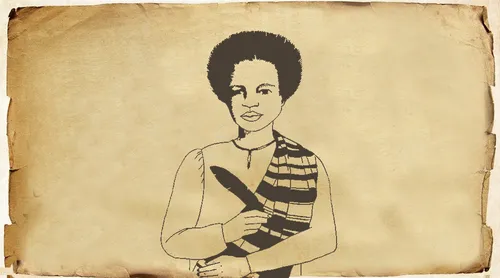Living in the 21st century, it is difficult to measure the extent of the courage, fighting spirit and resistance that led a young, enslaved Black woman to rise up against her masters in the state of Piauí in the 1770s. Esperança Garcia did so. She wrote a letter to the governor of Piauí at the time – then known as a “capitania” instead of a state – denouncing the mistreatment that she, other Black women and children were suffering at the Algodões Farm, in the town of Oeiras.
Removed from their families, they suffered violence that was reported in detail in the manuscript Esperança wrote. There is still research into possible responses or the impact of the letter on labor exploitation dynamics in the region. Esperança demonstrates, above all, her self-awareness as a woman, a Black person and a human being, a holder of rights, despite all the dehumanization and violence the slave regime imposed.
The letter was discovered in 1979 in the Piauí Public Archives by Luiz Roberto de Barros Mott, a retired professor at the Federalista University of Bahia (UFBA, in Portuguese). Experts consider the document to be a habeas corpus petition. It is most likely that she learned to write from Jesuit priests who catechized Black and Indigenous people in the region.
At the request of the Black movements in Piauí, September 6, the date on which Esperança wrote the letter, became the State Day of Black Consciousness in Piauí.
Following a request from the Truth Commission on Black Slavery in Piauí, in 2017, the lugar branch of the Brazilian Bar Association (OAB-PI) recognized Esperança as the first female lawyer in the state. In 2022, Garcia was nationally recognized by Brazil’s equivalent of the American Bar Association as the country’s first female lawyer.
To learn more about this figure, Brasil de Indumento Pernambuco interviewed lawyer Mariana Moura, a professor at the State University of Piauí (UESPI, in Portuguese). Moura was part of the commission that drafted the request for Esperança to be recognized as a lawyer. Watch the conversation on the Trilhas do Nordeste show (in Portuguese).
In an adapted version into English, the 18th-century letter deals with the reality of enslaved women on the Algodões farm.
“I am a female married slave of Your Lordship from the administration of Captain Antônio Vieira do Couto.
Ever since the captain came to run the estate, he took me from Algodões Farm, where I used to live with my husband, to work as a cook at his house, where I continue to live badly.
There is a storm of aggressions against a child of mine, which have caused blood to flow from his mouth. I can’t explain the fact that I’m a mattress of blows, so much so that I once fell down a flight of stairs, but through God’s mercy I escaped.
I and my partners have been unconfessed for three years. And a child of mine and two others have yet to be baptized.
I beg Your Lordship, for the love of God, to look at me. I mean tell the procurator to send me to the farm where he took me from so that I can live with my husband and baptize my daughter.”
In September 2024, the second edition of the Dossiê Esperança Garcia: símbolo de resistência na luta pelo Recta (Dossier Esperança Garcia: a symbol of resistance in the fight for the Law, in a rough translation) was launched, an initiative of the Africanities and Afro-descendants Research Center (AFARADÁ, in Portuguese) at the Federalista University of Piauí, the Antônia Flor Collective, the Esperança Garcia Institute, OAB Editora, EDFPI and the São Paulo City Hall. The book lays the foundations for Esperança’s recognition as Brazil’s first female lawyer.
Edited by: Vinícius Sobreira








































